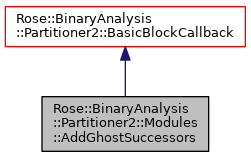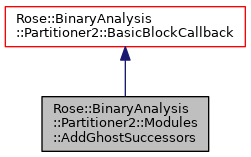Description
Follow basic block ghost edges.
If this callback is registered as a partitioner basic block callback then the partitioner will follow ghost edges when discovering instructions for basic blocks. A ghost edge is a control flow edge whose target address is mentioned in the machine instruction but which is never followed. Examples are branch instructions with opaque predicates due to the compiler not optimizing away the branch.
An alternative to following ghost edges as basic block instructions are discovered is to look for dead code after the function is discovered. That way the CFG does not contain edges into the dead code, which can make things like data flow analysis faster.
#include <Rose/BinaryAnalysis/Partitioner2/Modules.h>


Public Member Functions | |
| virtual bool | operator() (bool chain, const Args &args) override |
| Callback method. | |
 Public Member Functions inherited from Sawyer::SharedObject Public Member Functions inherited from Sawyer::SharedObject | |
| SharedObject () | |
| Default constructor. | |
| SharedObject (const SharedObject &) | |
| Copy constructor. | |
| virtual | ~SharedObject () |
| Virtual destructor. | |
| SharedObject & | operator= (const SharedObject &) |
| Assignment. | |
Static Public Member Functions | |
| static Ptr | instance () |
Additional Inherited Members | |
 Public Types inherited from Rose::BinaryAnalysis::Partitioner2::BasicBlockCallback Public Types inherited from Rose::BinaryAnalysis::Partitioner2::BasicBlockCallback | |
| enum | Termination { CONTINUE_DISCOVERY , TERMINATE_NOW , TERMINATE_PRIOR } |
| Whether to terminate a basic block. More... | |
| using | Ptr = BasicBlockCallbackPtr |
| Shared-ownership pointer to a BasicBlockCallback. | |
Member Function Documentation
◆ instance()
|
inlinestatic |
◆ operator()()
|
overridevirtual |
Callback method.
This is the method invoked for the callback. The chain argument is the return value from the previous callback in the list (true for the first callback). The successor callbacks use chain to indicate whether subsequent callbacks should do anything.
Implements Rose::BinaryAnalysis::Partitioner2::BasicBlockCallback.
The documentation for this class was generated from the following file: